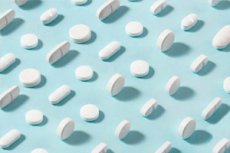New publications
New antipsychotic formula reduces weight gain and boosts serotonin levels
Last reviewed: 02.07.2025

All iLive content is medically reviewed or fact checked to ensure as much factual accuracy as possible.
We have strict sourcing guidelines and only link to reputable media sites, academic research institutions and, whenever possible, medically peer reviewed studies. Note that the numbers in parentheses ([1], [2], etc.) are clickable links to these studies.
If you feel that any of our content is inaccurate, out-of-date, or otherwise questionable, please select it and press Ctrl + Enter.

970 million people worldwide struggle with mental illness. However, when the recommended treatment includes antipsychotic drugs, the side effects often include extra pounds, which complicates an already difficult diagnosis.
Now, a study published in the journal Advanced Functional Materials by the University of South Australia shows that antipsychotic drugs can be redesigned with a specially designed coating that not only reduces unwanted weight gain, but also increases serotonin levels by more than 250%.
The researchers specifically tested Lurasidone, a drug used to treat schizophrenia and bipolar depression, finding that the new coatings targeted the gut microbiome to improve drug absorption by 8-fold while overcoming common side effects like weight gain.
The coatings are created from tiny core-shell particles made from the dietary fiber inulin and bioactive medium-chain triglycerides. The inulin shell improves the gut microbiome by providing an energy source for gut bacteria, while the medium-chain triglycerides facilitate absorption of the drug into the blood.
This is a breakthrough discovery that has the potential to change the lives of millions of people around the world.
Lead researcher Dr Paul Joyce, from the University of South Australia, says microbe-targeting microcapsules could improve treatment outcomes for mental illness.
"Most patients with schizophrenia or bipolar disorder are prescribed various antipsychotic drugs, which cause significant side effects by disrupting the gut microbiome - the microbial ecosystem that naturally colonizes the gut," says Dr. Joyce.
"The most noticeable side effect is weight gain, with many patients often seeing a 10% to 15% increase in body weight after just three months of treatment.
"Because the gut microbiome plays an important role in regulating overall health, especially mood and cognitive function, the negative impact of these drugs on the microbiome often makes them counterproductive.
"Instead of improving mood and cognitive function, the medications lead to a cascading cycle of worsening mental and metabolic health as patients now struggle with excess weight and mental health problems.
"The situation is made worse by the fact that most antipsychotics need to be taken with food to be maximally effective. But for a very vulnerable group of patients this can be difficult to achieve, leaving most patients with suboptimal blood levels of the drugs.
"Clearly, new strategies are needed to address the side effects and the need to take these drugs with food – and that's what we've achieved with Lurasidone.
"This study shows that when antipsychotic drugs are formulated with our new smart core-shell microparticles, drug absorption is increased, eliminating the need to take it with food, while enhancing the diversity and abundance of the gut microbiome to overcome common side effects such as weight gain.
"It is important to note that because we are not developing new drugs but repurposing existing ones, new treatments can be introduced into clinical practice quickly and we can expect them within the next few years, rather than the 10 to 15 years it takes for new drug molecules to be approved by regulatory authorities."
Next steps include testing the effectiveness of these reformulated drugs in patients, with long-term goals of expanding these technologies to all mental health therapies, including antidepressants, to mitigate any side effects.
